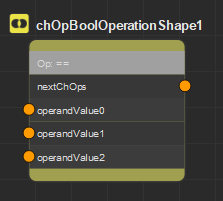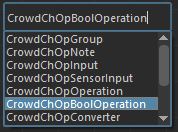| Operator |
Operator to apply to the previous channel operator value. Note that the number of previous channel operators that are taken into account may differs depending on the Operator value.
Available values are:
- == will return 1 if the 2 previous channel operators are equal. If a third channel operator is used as input, it will be considered as the tolerance to consider values as equal (takes only 2 or 3 values into account)
(previousChOp[0]==previousChOp[1])
- != will return 1 if the 2 previous channel operators are different. If a third channel operator is used as input, it will be considered as the tolerance to consider values as equal (takes only 2 or 3 values into account)
(previousChOp[0]!=previousChOp[1])
- > will return 1 if the the first previous channel operator is greater than the second previous channel operator. If a third channel operator is used as input, it will be considered as the tolerance to consider values as equal (takes only 2 or 3 values into account)
(previousChOp[0]>previousChOp[1])
- >= will return 1 if the the first previous channel operator is greater than or equal to the second previous channel operator. If a third channel operator is used as input, it will be considered as the tolerance to consider values as equal (takes only 2 or 3 values into account)
(previousChOp[0]>=previousChOp[1])
- < will return 1 if the the first previous channel operator is less than the second previous channel operator. If a third channel operator is used as input, it will be considered as the tolerance to consider values as equal (takes only 2 or 3 values into account)
(previousChOp[0]<previousChOp[1])
- <= will return 1 if the the first previous channel operator is less than or equal to the second previous channel operator. If a third channel operator is used as input, it will be considered as the tolerance to consider values as equal (takes only 2 or 3 values into account)
(previousChOp[0]<=previousChOp[1])
- AND will return 1 if all the previous channel operator returned 1 (takes 2 or more values into account)
(previousChOp[0]&&previousChOp[1]&&...&&previousChOp[x])
- OR will return 1 if one or more previous channel operator returned 1 (takes 2 or more values into account)
(previousChOp[0]||previousChOp[1]||...||previousChOp[x])
- XOR will return 1 if one one of the previous channel operator returned 1 (takes 2 or more values into account)
(previousChOp[0] xor previousChOp[1] xor ... xor previousChOp[x])
- NOT will invert the result of the previous channel operator (takes only 1 values into account)
(!previousChOp[0])
|









